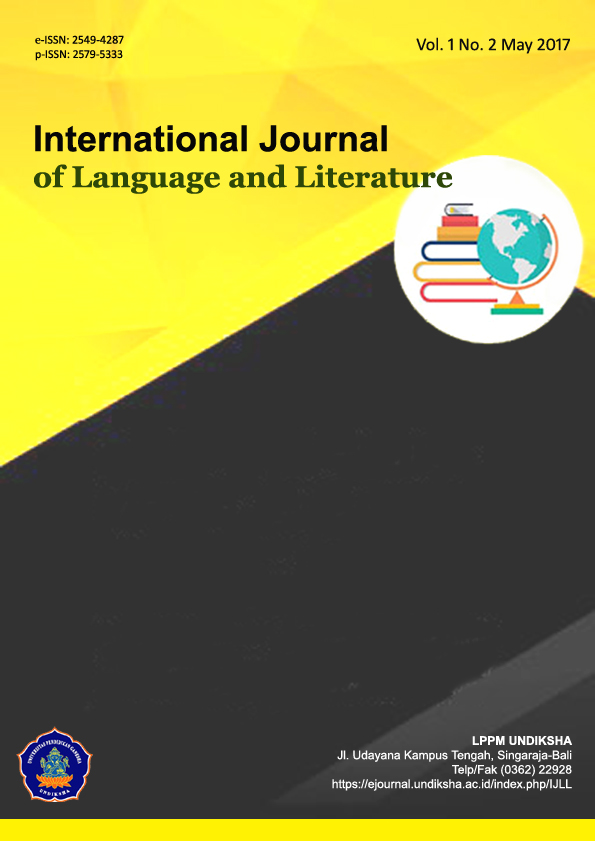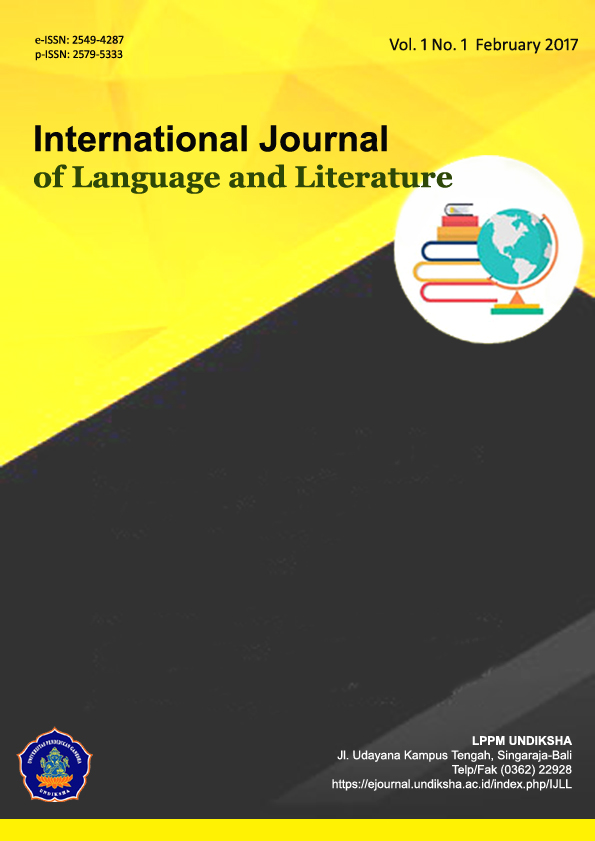THE EFFECT OF ROLE PLAY TECHNIQUE AND PERSONALITY TYPES ON THE SPEAKING COMPETENCY OF THE ELEVENTH GRADE STUDENTS OF S WIRA HARAPAN TEGALJAYA
DOI:
https://doi.org/10.23887/ijll.v1i2.12538Kata Kunci:
Role Play, Personality Types, Speaking CompetencyAbstrak
This research aimed at investigating the effect of role play technique and personality types on the speaking competency. Particulary, this research aimed at investigating whether or not between students who are taught by using role play and those who are taught by conventional technique there is (a) a significant difference in speaking competency; (b) a significant difference of speaking competency between extrovert students and introvert students; (c) an interactional effect of the implementation of teaching techniques and students’ personality types in speaking competency ; (d) a significant difference in speaking competency between extrovert students and (e) a significant difference in speaking competency between introvert students. This study was conducted at the eleventh grade students of SMK Wira Harapan Tegaljaya. To answer the research problems, 2x2 factorial designs was implemented. The collected data were analyzed descriptively and inferentially by using IBM SPSS Statistics. From the result of the study, it can be concluded that: (1) There is a significant difference of speaking competency between students who are taught by using role play technique and who are taught by using conventional technique, (2) there is a significant difference of speaking competency between extrovert students and introvert students, (3) there is no interaction effect between students personality and role play technique on students speaking competency. (4) there is a significant difference of speaking competency between extrovert students who are taught by using role play technique and those who are taught by using conventional technique and (5) there is a significant difference in speaking competency between introvert students who are taught by using role play technique and those who are taught by using conventional technique. These findings are expected to have important contribution to EFL speaking classroom in Indonesia especially for eleventh grade students in SMK Wira Harapan Tegaljaya.
Referensi
Alexander, L.G 1993 Question and answer: graded oral comprehension exercise. Yogyakarta: PenerbitKanisius, Longman Grow Limited.
Bailey, K., & Savage, L. 1994.New ways in teaching speaking. Alexandria,VA: Teachers of English to Speakers of Other Language TESOL.
Brown, D. H. 2000. Principles of language learning & teaching. 4th ed.. New York: Longman.
Fraenkel, J.R and Wallen, N.E. 1993.How to design and evaluate research education. Singapore: Mc.GrawHill.inc.
Kerr, D., Troth, A., Pickering, A. 2013. The Use of Role-Playing To Help Students Understand Information Systems Case Studies. Journal of Information Systems Education, Vol. 14. Retrieved
Ladousse, G. P. 1987. Role play. Oxford: Oxford University Press.
Laney, M. O. 2001. The introvert advantage: How to thrive in an extrovert world. New York: Workman Publishing.
Larsen-Freeman, D 1986 Techniques & Principles in language Teaching. Oxford: Oxford University Press.
Martin, C.R. 1997. Extraversion or introversion. Retrieved from http://www.myersbriggs.org/my-mbti-personality-type/mbti-basics/extraversion-or-introversion.htm. on 3 January 2013.
Matthews, G., Zeidner, M., & Roberts, R. D. 2007. Emotional intelligence:Knowns
Mayer JD. 2007. Emotion, intelligence, emotional intelligence. in the handbook of affect and social cognition. New Jersey: Erlbaum
Mogra, I. 2012. Role play in teacher education: is there still a place for it. teacher education advancement network journal. Retrieved from http://194.81.189.19/ojs/index.php/TEAN/article/viewFile/127/243 on 13 May 2013
Nunan. D. 1987. Communicative language teaching: Making it work. English Language Teaching Journal, 41, 136-145.
Oliver, K.A. 2012. Introversion/extraversion : Dimension of Personality.Retrieved from https://lib.ku.edu/sites/lib.drupal.ku.edu/files/docs/KULSS/INTROVERSIONEXTRAVERSION.pdf. on 24 December 2012
Rahimy, R., Safarpour, S. 2012. The effect of using role-play on iranian efl learners’ speaking ability. Asian Journal Of Social Sciences & Humanities. Retrieved from http://www.ajssh.leena-luna.co.jp/AJSSHPDFs/Vol.13/AJSSH20121.3-06.pdf on 13 May 2013
Richard, J.C. 2008. Teaching listening and speaking: from theory to practice. Cambridge: Cambridge Press University.
Vizeshfar, F., Dehghanrad, F., Magharei, M., Sobhani, J. 2013. Effects of applying role playing approach on nursing students' education. international journal of humanities and cultural studies. Retrieved from https://www.researchgate.net/publication/307378846_Effects_of_Applying_Role_Playing_Approach_on_Nursing_Students%27_Education on 15 May 2013
Yousefzadeh, M., Hoshmandi, M.S. 2013. A study of educational effect of applying role –playing teaching method in history classroom. International Research Journal of Applied and Basic Sciences. Retrieved from http://www.irjabs.com/files_site/paperlist/r_2109_140331151247.pdf on 13 May 2013
Unduhan
Diterbitkan
Cara Mengutip
Terbitan
Bagian
Lisensi
IJLL Journal provides immediate open access to its content on the principle that making research freely available to the public to supports a greater global exchange of knowledge.

This work is licensed under a Creative Commons Attribution-ShareAlike 4.0 International License








